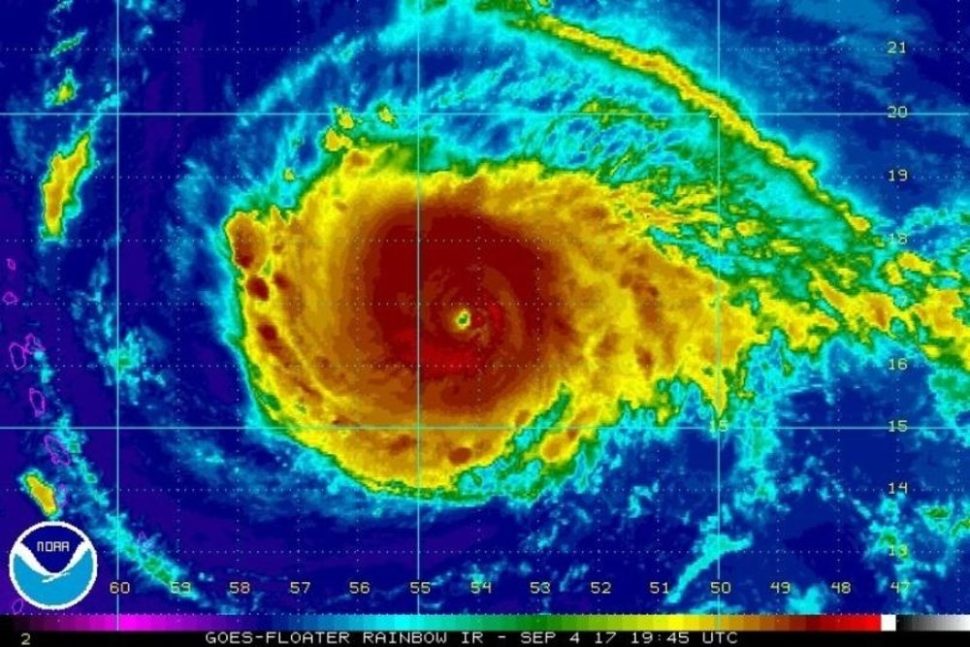People residing at the Eastern Seaboard of the United States are now at the edge of facing one of the strongest storms from the Atlantic: Category 5 Hurricane Irma.
It was just last week when Louisiana, Southeast Texas, and in particular, Houston, were ravaged by Category 3 Hurricane Harvey.
Just when everyone thought the worse had come to pass, the states of Florida, Puerto Rico, U.S. Virgin Islands, and some Caribbean Islands are now bracing themselves for the catastrophic impact of Hurricane Irma, which is right now a Category 5 hurricane.
Most recent reports said that Irma is now heading towards the Caribbean island group of Lesser Antilles. To date, Irma is considered the strongest hurricane ever recorded outside of the Caribbean and the Gulf of Mexico.
#HurricaneIrma is here! Already reaches Category 5 with wind speed of 185mph!Click To TweetThe Category 5 Hurricane Irma is currently packing winds of 185 mph and has already made landfall in Barbuda. Local reports on social media showed damages to buildings on several islands including St. Barthélemy and St. Martin.
The storm is expected to move towards Puerto Rico and will affect other nearby islands such as St. Kitts and Nevis, the Virgin Islands, and Hispaniola. Hurricane Irma is said to make landfall in Florida this coming weekend.
President Donald Trump has already declared a state of emergency in Florida, Puerto Rico, and the Virgin Islands. Local authorities have also issued evacuation orders to people living in Florida’s coastal areas.
With Hurricane Irma’s strength, there is no doubt that it would wreak havoc along its way. If you are living in an area that would potentially be hit by a Category 5 hurricane, do you know what you should do?
How to Prepare for a Category 5 Hurricane
1. Know what you are up against
Hurricanes are bigger than tropical storms. Experts are using the five-point Saffir-Simpson Scale to categorize them. A Cat 5 hurricane has a wind speed of over 155 miles per hour. Keep in mind that Category 5 hurricanes can do 500 times more damage than a Category 1 hurricane.
2. Be aware of your surroundings
Hurricanes are highly dependent on the environment around them to sustain their strength. Typically, they draw energy from seawater that has been heated to at least 80 degrees Fahrenheit. Using this warm energy drawn into the eye of the storm, hurricanes can cause tidal surges which can decimate coastal areas.
Meaning, if you are near the coast in a location where the hurricane will make landfall (particularly on the north and eastern side of the storm in the northern hemisphere), leave for safer grounds ahead of time.
3. EVACUATE IMMEDIATELY WHEN ASKED TO DO SO
When local authorities in your area issued an evacuation order, follow it without any hesitation.
Always remember that officials constantly monitor the movement of any hurricane, especially storms making landfall, Category 5 or tropical depression. These professionals will equip local media and you with the necessary information–including the potential dangers.
When you’re asked to leave your home, it means the storm has become a danger to life in the evacuation area.
4. Know where to go when stranded in the middle of a hurricane
If you found yourself stranded in the midst of a Category 5 hurricane, it is best to look for a safe place to hole yourself up until it passes or rescue arrives. If you are outside a flood area, a basement is considered the safest place during a hurricane, as high winds and debris threaten the windows and walls of your above-ground home.
If you have no basement like most of the homes near the Gulf Coast, shelter in the innermost-closet or a bathroom without windows.
If you think you can’t be safe in your home, look for a secure place within a few blocks of your location, seek refuge, and stay away from windows. When the storm’s peak winds are affecting your area, stay under cover.
All debris is deadly during hurricane winds.
5. Invest in a NOAA weather radio
Invest in a National Oceanic and Atmospheric Administration (NOAA) weather radio. It will help you keep track of what is going on especially during power outages.
6. Prepare a survival kit ahead of time
Hurricanes are hard to predict initially but they also move very slowly.
Surely, if you are regularly watching the news, you will know when and where a Category 5 hurricane will hit. Knowing this basic information will give you ample time to prepare a survival kit that should help you hunker down for at least three days.
The Federal Emergency Management Agency (FEMA) has released a checklist on what should be included in an emergency survival kit.
The list includes:
- drinking water,
- food,
- NOAA weather radio,
- flashlight and batteries,
- first aid kit,
- and whistle.
To get a full copy of the list, click here.
Also, when preparing a survival kit, make sure that you prepare one kit PER PERSON.
7. Prepare for power outages
Hurricanes can damage electric posts and cause power outages. Consider investing in a small generator in order to have access to electricity.
8. Prepare your home for possible flooding
Category 5 hurricanes carry with them heavy rainfall and the possibility of flooding. Secure all your important documents and belongings. If possible, leave your home and stay with friends and relatives outside of the flood zone.
Emergency Contact Numbers to Call During a Calamity
Always remember that being prepared is the best way to survive any disaster.
Aside from that, it is also important that you are aware of the hotline numbers that you should call in case you needed help during a storm.
Here are some Hurricane Irma emergency contact numbers that you can call anytime:
City of Fort Lauderdale
- Hurricane Emergency Hotline – 954-828-8888
- 24-Hour Customer Service Center– 954-828-8000
- Police Department – Non-Emergency – 954-764-4357 or 954-764-HELP / Emergency – 911
- City Commission Office– 954-828-5003
- City Hall– 954-828-8000
Broward County
- Broward County Emergency Management Division – 954-831-3900
- Broward County Hurricane Hotline– 954-831-4000
- Special Needs Registry with Broward County Human Services – 954-831-3902
- Hearing-Impaired (TTY) Special Needs Registrywith Broward County Human Services – 954-357-5608
- Mass Transit– 954-357-8400
State and Federal Government
- Division of Emergency Management– 850-413-9900
- Federal Emergency Management Agency (FEMA)– 1-800-621-3362 or 1-800-FEMA
- National Flood Insurance– 1-888-379-9531
Other
- Florida Power & Light (FPL)– 1-800-468-8243 or 1-800-4OUTAGE
- AT&T / BellSouth Repair Service– 1-877-737-2478
- TECO / People’s Gas Company– 1-877-832-6747
- American Red Cross (Broward Chapter)– 954-763-9900
West Palm Beach
- American Red Cross- 561-833-7711
- Animal Care & Control- 561-233-1200
- Code Enforcement- 561-233-5500
- Consumer Affairs- 561-712-6600
- Constitutional Tax Collector- 561-355-2264
- Contractor Certification- 561-233-5525
- EMERGENCY- 911
- Emergency Management Division- 561-712-6400
- Crisis Hotline- 211
- Consumer Services Storm Hotline- 800-227-8676
- Engineering & Public Works- 561-684-4000
- FEMA- 800-621-3362
- Fire Rescue – Non-Emergency- 561-712-6550
- FPL Power Outage- 800-468-8243
- Health Department Administration- 561-840-4500
- Palm Tran- 561-841-4200
- Palm Tran Connection- 561-649-9838
- Parks and Recreation- 561-966-6600
- PBC Water Utilities Department- 561-740-4600 (opt. 2)
- PBC Water Utilities Customer Service- 561-740-4600 (opt.1)
Check your water bill to determine who provides your water.
- Roads, Drainage, Traffic- 561-684-4018
- Salvation Army- 561-686-3530
- Sheriff (PBSO) – Non-Emergency- 561-688-3000
- Solid Waste Authority- 561-640-4000
- TDD (HEARING IMPAIRED)- 561-712-6343
- Traffic Signal Repair- 561-683-6885
- United Way- 561-375-6600



















Comments (0)
Most Recent